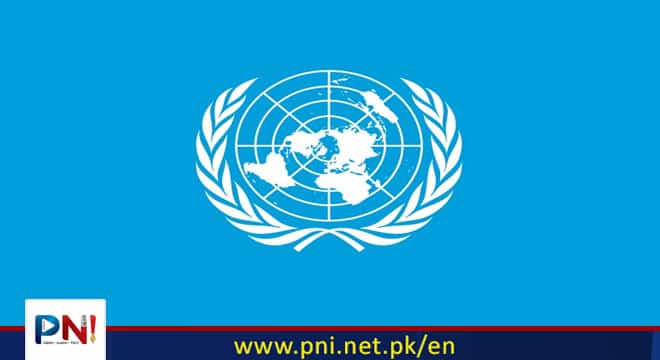UNITED NATIONS, Dec 30 (APP): A senior UN official warned of the risk of a spillover of the conflict in Gaza with “devastating consequences” for the entire region as the UN Security Council again met on Friday to discuss the grave situations in the Middle East. The 15-member Council met at the request of the United Arab Emirates (UAE), a non-permanent member, with Emirati Ambassador Lana Zaki Nusseibeh underscoring the need to end the Israel-Palestinian conflict to be complemented by an international presence to monitor the ceasefire for it to hold.
The meeting follows a resolution adopted last week by the Security Council calling for a scale-up in aid deliveries to civilians in the Gaza Strip. The resolution passed with 13 votes in favour, and the US and Russia abstaining. But Friday’s meeting ended after listening to members, without taking any action. Briefing the Security Council, Khaled Khiari, UN Assistant Secretary-General for the Middle East, said that the situation in the Middle East is alarming and continues to deteriorate, including “several interconnected theatres conflict”. He noted “intense” Israeli ground operations and fighting between Israeli forces and Hamas and other groups in most areas of Gaza.
“Civilians from both sides, particularly in the Gaza strip currently, continue to bear the brunt of this conflict,” he said. Reiterating the Secretary-General’s call for an immediate humanitarian ceasefire in Gaza, Khiari warned that the risk of regional spillover of this conflict with potential devastating consequences for the entire region “remains high” given also a multitude of actors involved. He informed Council members of “continued daily exchanges” of fire across the Blue Line between Lebanon and Israel, posing a “grave risk” to regional stability. “Increasingly, there have been strikes on civilian areas, with civilian casualties, on both sides of the Blue Line, in addition to a rising number of fatalities among combatants,” he added. Khiari also noted attacks on US bases in Iraq and Syria, with the US conducting some airstrikes against groups suspected of these actions in Iraq and Syria. He also cited reports of Israeli air strikes inside Syria, as well as tensions in the Red Sea.
Tor Wennesland, the UN Special Envoy for the Middle East Peace Process, voiced “deep concerns” over escalating tensions in the occupied West Bank, including East Jerusalem. In his remarks, he noted “intensified armed exchanges” between Palestinians and Israeli security forces, predominantly in the context of Israeli operations, which led to exceedingly high levels of fatalities and arrests. Wennesland also expressed alarm at lethal attacks carried out by Israeli settlers against Palestinians and by Palestinians against Israelis in the occupied West Bank and Israel. “All perpetrators of violence must be held accountable and swiftly brought to justice,” he stressed. Majed Bamya, Deputy Permanent Observer of the Observer State of Palestine addressed the Security Council, stating that the killing of Palestinian civilians is “not a collateral effect” of war.
United Nations Majed Bamya, Deputy Permanent Observer of the Observer State of Palestine, said that the Israeli assault relies, by design, on the mass and indiscriminate killing of civilians. “The humanitarian catastrophe is not the consequence of the war, it is a tool employed by Israel to pressure people and force them out,” the Palestinian envoy said. He went on to note that the Council has called for the protection of civilians and for immediate, safe, unhindered and expanded humanitarian access to deliver assistance throughout the Gaza Strip, for respect for the laws of laws, and that it has rejected forced displacement. “All of which require an immediate ceasefire that this Council has been prevented to call for, repeatedly,” Bamya said, noting that Israel has reacted with “disregard and disdain.” “Why are they getting away with murder at this unprecedented scale,” he said, adding “Because they were never held accountable.” “That is why they confess to their crimes, that is why steal our lives, our land, our resources, our money, our past, our present and our future in broad daylight,” the Palestinian envoy said. John Kelley, Minister-Counsellor at the United States Mission to the UN, said that his country shared the concern regarding the “sharp increase” in violence by extremist settlers in the West Bank and the “unprecedented” number of Palestinian fatalities there as well as in Gaza. “We know 2023 has been the deadliest year for Palestinians in the West Bank,” he said. “The United States continues to stress to the Israeli Government the importance of preventing extremist settler violence as well as investigating and holding accountable those who comment acts of violence,” he added.
Kelley also noted that the US will continue to implement visa restrictions, announced on 5 December, targeting individuals believed to have been “involved in or meaningfully contributed” to undermining peace, security and stability in the West Bank. “These restrictions reinforce the US’ long-held belief advancing settlements in the West Bank undermines the prospects of a future Palestinian State and a two-State solution, as do any actions that undermine stability in the West Bank, including attacks by Israeli settlers against Palestinians and Palestinian attacks against Israelis,” he said. “Let us be clear, a two-state solution where Israelis and Palestinians live side by side in peace, is the path to peace,” he added.
Follow the PNI Facebook page for the latest news and updates.









